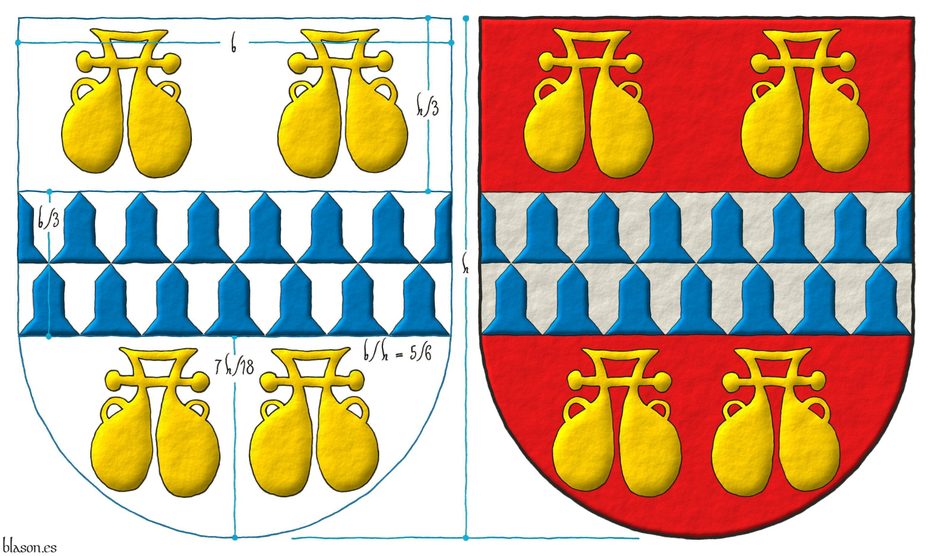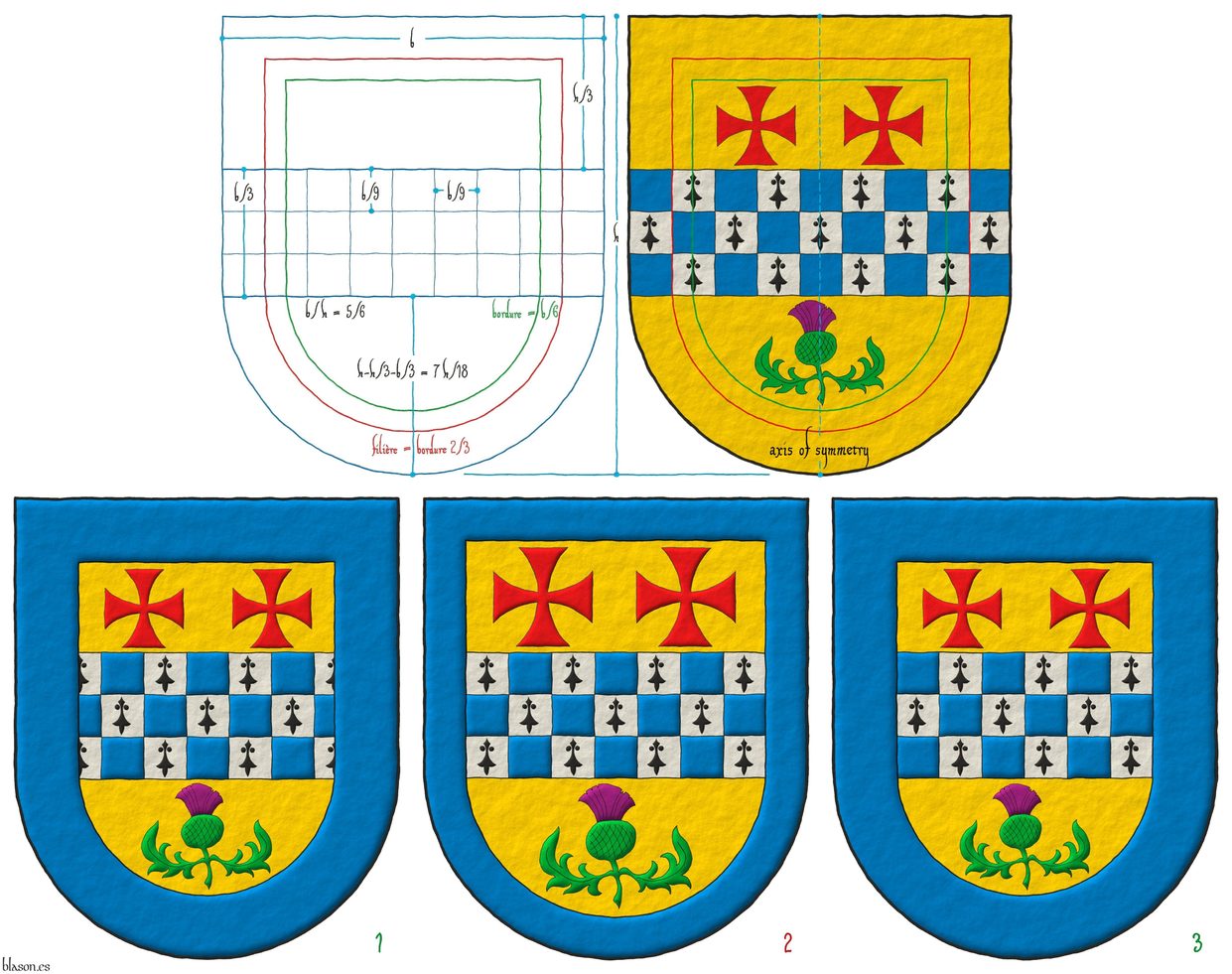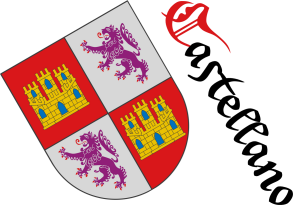
Teresa Otxoa Magaña, plain tincture
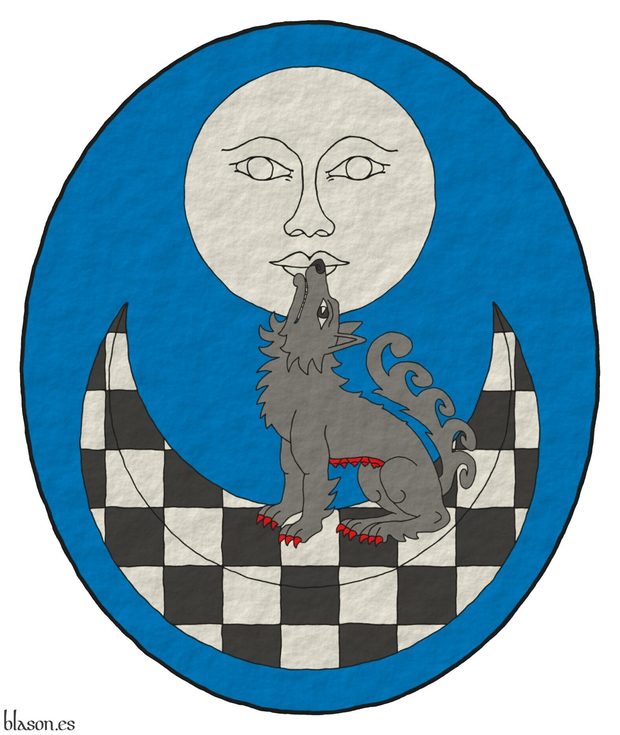
Azure, in chief a moon with human face Argent, in base a crescent chequey Sable and Argent; overall a she-wolf ululant, sejant on the crescent proper, armed and the udders Gules.
Arms emblazoned by me, in plain tinctures, outlined in Sable, with an oval external shape and with a texturized finish.
The coat of arms of Teresa Otxoa Magaña designed by her and her husband Juan Lanzagorta Vallín, and emblazoned by me. Blazon written in Italian by Vittorio Gifra, «Arma: d'azzurro, alla luna figurata d'argento posta in capo, accompanata in punta da un crescente montante scaccato di nero e d'argento; alla lupa di nero sul tutto, seduta su esso crescente, armata e mammellata di rosso».
Blazon keywords: Azure, Argent, Sable, Gules, One, Chief, Moon, With human face, Base, Crescent, Chequey, Overall, She-wolf, Ululant, Sejant, Proper, Armed and Udder.
Style keywords: Outlined in sable, Plain tincture and Oval.
Classification: Personal, Interpreted, Boa and Coat of arms.
Bearer: Otxoa Magaña, Teresa.


Otxoa Magaña, Teresa
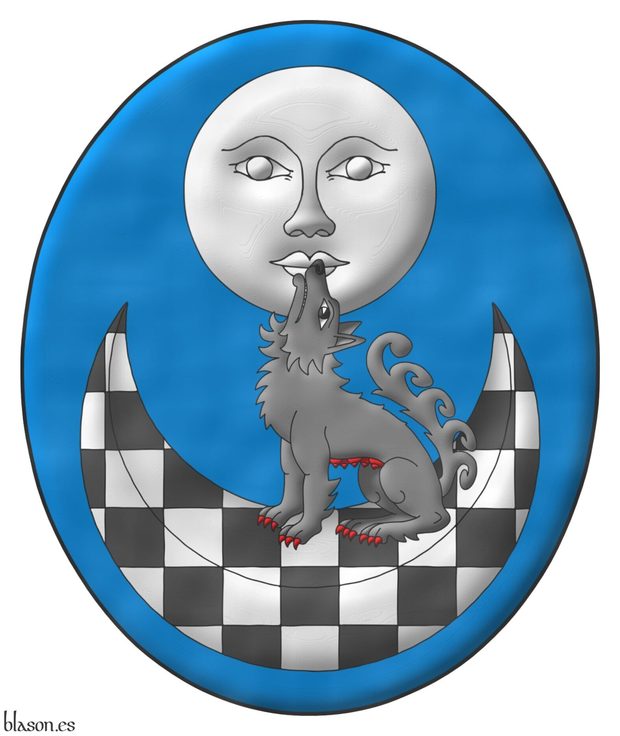
Azure, in chief a moon with human face Argent, in base a crescent chequey Sable and Argent; overall a she-wolf ululant, sejant on the crescent proper, armed and the udders Gules.
Escudo de azur, en jefe una luna figurada de plata, en punta un creciente ajedrezado de sable y plata; brochante sobre el todo una loba aullante, sentada en el creciente al natural, armada y ubres de gules.
Coat of arms emblazoned by me, highlighted with lights and shadows, outlined in Sable, with an oval external shape and with a watercolor finish.
The coat of arms of Teresa Otxoa Magaña designed by her and her husband Juan Lanzagorta Vallín, and emblazoned by me. The primitive arms of the Otxoa lineage feature wolves, as the name derives from the Basque word «otso» meaning wolf and she-wolf, therefore, both the arms of the lineage and hers are «canting arms», though hers specifically feature a she-wolf.
Blazon keywords: Azure, Argent, Sable, Gules, One, Chief, Moon, With human face, Base, Crescent, Chequey, Overall, She-wolf, Ululant, Sejant, Proper, Armed and Udder.
Style keywords: Outlined in sable, Illuminated, Oval and Watercolor.
Classification: Personal, Interpreted, Boa and Coat of arms.
Bearer: Otxoa Magaña, Teresa.


Motto around the shield of Teresa Otxoa Magaña
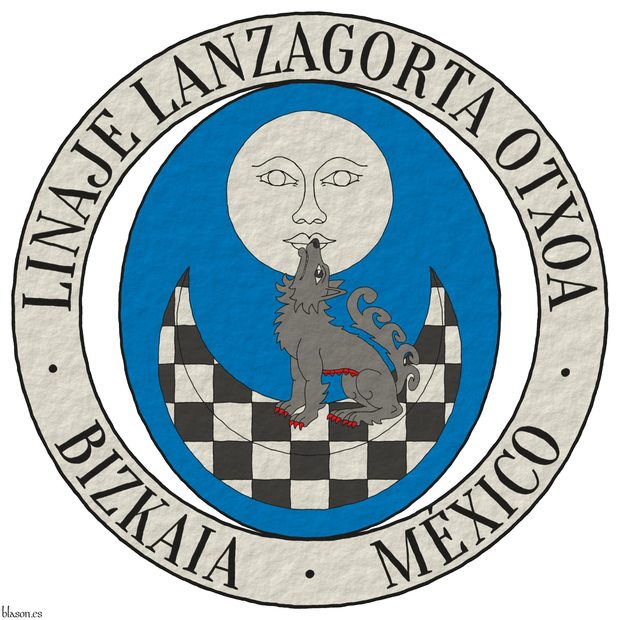
Azure, in chief a moon with human face Argent, in base a crescent chequey Sable and Argent; overall a she-wolf ululant, sejant on the crescent proper, armed and the udders Gules. Motto around the shield: «Linaje Lanzagorta Otxoa · Bizkaia · México» Sable over a scroll Argent.
Arms depicted by me, in plain tinctures, outlined in Sable, with an oval outer contour and with a texturized finish.
The coat of arms of Teresa Otxoa Magaña designed by her and her husband Juan Lanzagorta Vallín, and emblazoned by me.
Blazon keywords: Azure, Argent, Sable, Gules, One, Chief, Moon, With human face, Base, Crescent, Chequey, Overall, She-wolf, Ululant, Sejant, Proper, Armed, Udder, Within, Motto (identification) and Scroll.
Style keywords: Outlined in sable, Plain tincture and Oval.
Classification: Personal, Interpreted, Boa and Coat of arms.
Bearer: Otxoa Magaña, Teresa.


Design with a fess between 4 water-bougets
Design ideas
The heraldic art often involves resolving design challenges while maintaining both aesthetic balance and adherence to tradition. The coat of arms illustrated here draws inspiration from the Dethick-Dethicke family arms of Derbyshire, though it features distinct differences. This design explores the placement of water-bougets, a medieval water vessel, in a 2+2 arrangement, with a fess vair.
One key consideration when arranging charges in heraldry is proportionality. In this case, the fess occupies 1/3 of the coat of arms's width and is positioned 1/3 of the height from the chief, rather than at the exact center, allowing the charges to balance harmoniously. The shape of the shield itself also plays a role: rounded shields can accommodate a 2+2 arrangement more comfortably than shields with a pointed base, which are better suited to 2+1 arrangements, this is de case of Dethick's arms.
Another challenge in heraldic design is asymmetry. To address the natural curves of the shield, the water-bougets may vary slightly in size or placement. This intentional asymmetry can help create a visually appealing composition that respects both tradition and the unique constraints of each design, because, heraldry is not only about rules but also about creativity.
Gules, a fess vair between four water-bougets Or, two in chief and two in base.
Escudo de gules, una faja de veros acompañada de cuatro pares de odres de oro, dos en jefe y dos en punta.
Water-bouget
In German, they are called «Wasserschlauch» in English «water-bougets» or «oges», and in French «bouses» or «chantepleures».
There is no specific heraldic term for them in Castilian. Based on «chantepleures», one could use «cantimploras», which are metallic or at least rigid. On the other hand, «oges» could translate as «odres», as they are typically made of leather as in this case. Additionally, since «water-bouget» are designed as a pair to be carried by a donkey or other animal, I have decided to use «par de odres» to convey the idea of one on each side of the animal.
In English, when there is a single charge, that is, a pair of water vessels, it is written in singular as «water-bouget», as can be seen in [Fox-Davies, A. C.; 1909; figure 551]. [Friar, S.; 1987; page 68] defines «bouget» as «...a stylized representation of a yoke supporting two leather waterbags».
Blazon keywords: Gules, One, Fess, Vair, Between, Four, Water-bouget, Or, Two, In chief and In base.
Style keywords: Ratio, Outlined, Outlined in sable, Illuminated, Semi-circular and Freehand.
Classification: Interpreted, Schema and Coat of arms.


John Stuart, schema 2x3
Or, a fess chequey Argent, charged with an ermine spot, and Azure, between in chief two cross patty Gules, in base a thistle proper; a diminished bordure Azure.
The coat of arms of Reverend John Stuart, XVIII century, emblazoned by me in 3 approaches: 1) Classic bordure: Using a bordure with a width equal to 1/6 of the coat of arms' base. In the image, this is marked with texts and lines in Vert. Notice that the squares in columns 2 and 8 are split by the inner border of the bordure, which is unfortunate as it disrupts the design. 2) Diminished bordure: Using a narrower bordure with a width equal to 2/3 of the classic bordure, corresponding to 1 square of the fess chequey. In the image, this is marked with texts and lines in Gules. This approach avoids splitting any squares, allows for larger figures, and is my preferred solution. In England, diminished bordures, often simply blazoned as bordure, are more common than in Castile. 3) Without squares splitted: Retaining the classic bordure but shifting the fess chequey 1/2 square to either dexter or sinister to prevent splitting squares. However, this sacrifices the symmetry of the design. This last adjustment was used in the hatchment of Reverend John Stuart in St. George's Cathedral, Kingston, Ontario, 1785.
Blazon keywords: Or, Argent, Azure, One, Three, Nine, Two, Fess, Chequey, Charged, Ermine spot, Between, In chief, Cross, Patty, In base, Thistle, Proper and Diminished bordure.
Style keywords: Ratio, Outlined in sable, Illuminated, Semi-circular and Freehand.
Classification: Personal, Interpreted, Schema, Boa and Coat of arms.
Bearer: Stuart, John.


Stuart, John
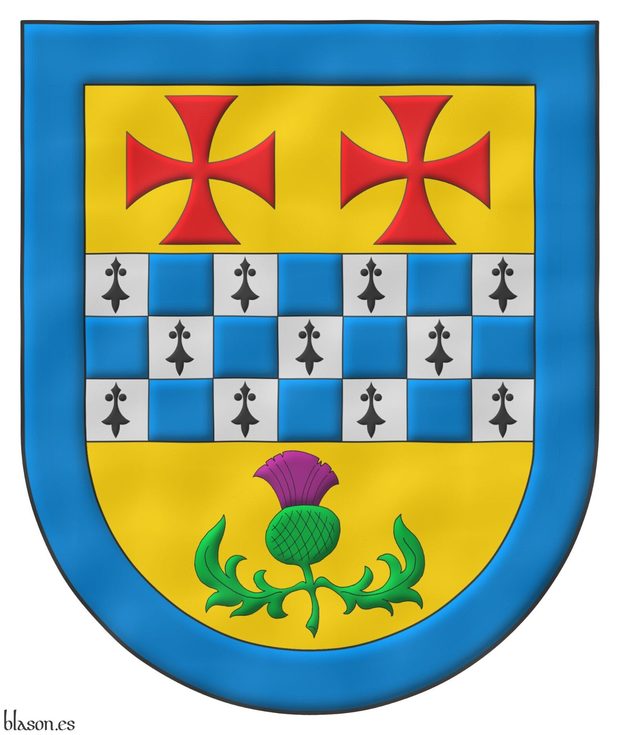
Or, a fess chequey Argent, charged with an ermine spot, and Azure, between in chief two cross patty Gules, in base a thistle proper; a diminished bordure Azure.
Escudo de oro, una faja ajedrezada de plata, cargada de una cola de armiño, y azur, acompañada en jefe de dos cruces patadas de gules, en base de un cardo al natural; una filiera de azur.
Coat of arms painted by me, highlighted with lights and shadows, outlined in Sable, with a semi-circular outer contour and with a watercolor finish.
Coat of arms of Reverend John Stuart, XVIII century, emblazoned by me.
Blazon keywords: Or, Argent, Azure, One, Three, Nine, Two, Fess, Chequey, Charged, Ermine spot, Between, In chief, Cross, Patty, In base, Thistle, Proper and Diminished bordure.
Style keywords: Outlined in sable, Illuminated, Semi-circular and Watercolor.
Classification: Personal, Interpreted, Boa and Coat of arms.
Bearer: Stuart, John.


Stewart of Scotland, lineage
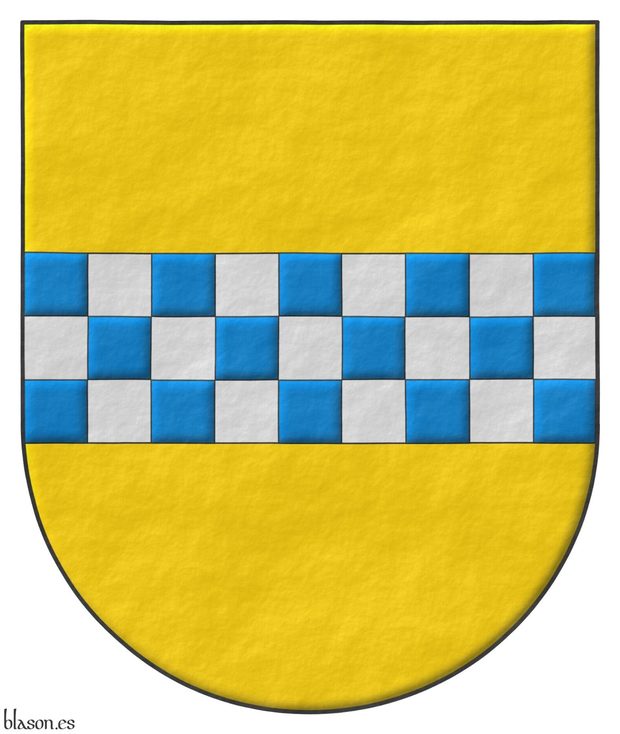
Or, a fess chequey Azure and Argent.
Escudo de oro, una faja ajedrezada de azur y plata.
Coat of arms emblazoned by me, illuminated with lights and shadows, outlined in Sable, with a semi-circular outer contour and with a rough finishing.
Coat of arms of the lineage Stewart of Scotland. I have emblazoned it with a fess chequy of 3 rows, symmetric and with 9 columns of squares, provided that its height is 1/3 of the width of the coat of arms.
Blazon keywords: Or, Azure, Argent, One, Three, Nine, Fess and Chequey.
Style keywords: Outlined in sable, Illuminated, Semi-circular and Rough.
Classification: Personal, Lineage, Interpreted, Boa and Coat of arms.
Bearer: Stewart of Scotland, lineage.


Boyd of Scotland, lineage
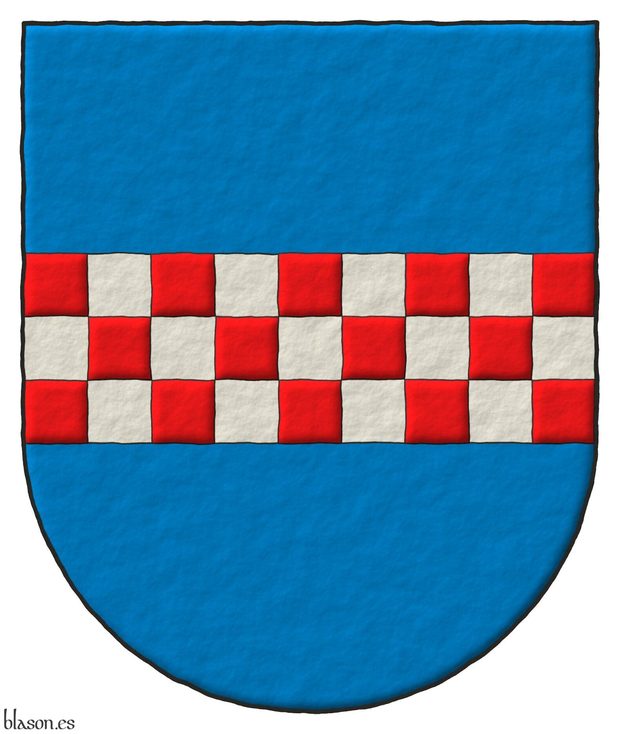
Azure, a fess chequey Gules and Argent.
Escudo de azur, una faja ajedrezada de gules y plata.
Coat of arms interpreted by me, highlighted with lights and shadows, contoured in Sable, with a semi-circular external shape and with a freehand finishing.
Coat of arms of the lineage Boyd of Scotland. I have emblazoned it with a fess chequy of 3 rows, symmetric and with 9 columns of squares, provided that its height is 1/3 of the width of the coat of arms.
Blazon keywords: Azure, Gules, Argent, One, Three, Nine, Fess and Chequey.
Style keywords: Outlined in sable, Illuminated, Semi-circular and Freehand.
Classification: Personal, Lineage, Interpreted, Boa and Coat of arms.
Bearer: Boyd of Scotland, lineage.

Continue with: Janovsti of Janovic of Czechia, lineage.
-
Language
-
Categories of heraldry
-
Divisions of the field
- Without divisions
- Party per pale
- Party per fess
- Party per bend
- Party per bend sinister
- Tierce
- Tierce sinister
- Tierced per pale
- Tierced per fess
- Tierced per bend
- Tierced pallwise inverted
- Quarterly
- Quarterly per saltire
- Gyronny
- Party per fess, the chief per pale
- Party per pale, the sinister per fess
- Party per fess, the base per pale
- Party per pale, the dexter per fess
- Chapé
- Chaussé
- Embrassé
- Contre-embrassé
- Party per chevron
- Enté
- Enté en point
- Flanched
-
Metals
-
Colours
-
Furs
-
Other tinctures
-
Ordinaries and sub-ordinaries
-
Diminutives of the ordinaries
-
Other charges
-
Charges from Nature
Water, Eagle, Bald eagle, Eagle claw, Dorsal fin, Tail fin, Two hands clasped, Lark, Tree, Trunk, Rainbow, Atom, Barbel, Acorn, Bighorn sheep, Arm, Owl, Vulture, Horse, Head, Goat, Camellia, Thistle, Merino ram, Kapok tree, Stag, Doe, Crescent, Increscent, Chrysanthemum, Tail, Tail addorsed, Ermine spot, Hummingbird, Snowflake, Heart, Roe deer, Neck, Stags' attires, Roe deers' attires, Raven, Dolphin, Diamond, Tooth, Elephant, Trunk (elephant), Beetle, Emerald, Starling, Mullet, Mullet of four points, Star of David, Estoile, Male figure, Fleur de lis, Flower, Cornflower, Dogwood flower, Lotus flower, Hop cone, Bluebonnet, Puffin, Ash, Rooster, Claw, Talon, Goose, Heron, Seagull, Pomegranate, Sunflower, Swallow-tail, Falcon, Leaf, Boar, Goldfinch, Laurel, Barn owl, Lion, Lioness, Lion passant, Leopard, Lion rampant guardant, Lynx, Lily, Madonna lily, Flame, Wolf, She-wolf, Parrot, Moon, Hand, Apple, Apple tree, Sea, Martlet, Wing, Two wings in vol, Covert, Blackbird, Mount, Trimount, Fly, Wrist, Elm, Olive tree, Orbital, Bear, Palm frond, Palm tree, Dove, Poplar leaf, Panther, Jaguar, Vine, Paw, Forepaw, Foot (palmiped), Foreleg, Peacock, Chest, Pelican, Pelican in her piety, Dog, Brach hound, Warren hound, Fish, Hoof, Beak, Feather, Ostrich feather, Cinquefoil, Quetzal, Branch, Sprig, Frog, Shamrock, Caboshed, Oak, Holm oak, Rose, Double rose, Savage, Serpent, Plough of Ursa Major, Sun, Sun in splendour, Ray of the sun, Lightning flash, River, Stem, Badger, Tyger, Linden, Wheat, Wheat spike, Bull, Tulip, Udder, Escallop and Fox.
-
Artificial charges
Halberd, Plough share, Ace of spades, Anchor, Cyclamor, Torch, Bow, Arch, Harp, Non-classic artifact, Winnowing fan, Crozier, Conductor's baton, Pair of scales, Ship, Oar, Sail, Norman ship, Beret, Grenade, Ecclesiastical cap, Arm vambraced, Knight, Chain, Cup, Covered cup, Monstrance, Bell, Bell tower, Cannon, Cannon dismounted, Cannon port, Carbuncle, Castle, Ribbon, Clarion, Nail, Crucible, Cord, Dagger, Key ward, Turret, With a turret, Armillary sphere, Sword, Federschwert, Sabre, Parchment, Scroll, Skirt, Arrow, Club, Garb, Sheaf of tobacco, Scythe, Gauntlet, Axe, Buckle, Galician granary, Host, Bonfire, Polish winged hussar, Church, Fanon, Oil lamp, Spear, Spear's head, Fleam, Letter, Book, Open book, Closed book, Bookmark, Page, Line, Lantern, Key, Four crescents joined millsailwise, Hammer, Two-handed sword, Menorah, Mortar, Pestle, Number, Knot, Celtic Trinity knot, Water-bouget, Comb, Piano, Millstone, Millrind, Millwheel, Quill, Clay pot, Potent, Bridge, Cuffed, Hourglass, Chess rooks, Compass rose, Rosette of acanthus leaves, Mullet of six points pierced, Broken, Portcullis, Wheel, Wagon-wheel, Symbol, Sackbut, Drum, Loincloth, Geometric solid, Tetrahedron, Tower, Trident, Trumpet, Double vajra and Anvil.
-
Immaterial charges
Angel, Archangel, Basilisk, Heart enflamed, Sacred Heart of Jesus, Paschal lamb, Dragon's head, Dragon, Wyvern, Phoenix, Garuda, Griffin, Sea-griffin, Winged hand, Our Lady of Mercy, Pegasus, Saint George, Mermaid, Trinity, Triton, Golden fleece, Unicorn and Ouroboros.
-
External elements
-
Heraldic creations
-
References
-
Formats
-
Keywords on this page
Between, Watercolor, Chequey, Proper, Armed, Ululant, Azure, Boa, Boyd of Scotland, lineage, Overall, Base, Thistle, Charged, Ermine spot, Crescent, Cross, Outlined in sable, Two, In chief, In base, Coat of arms, Schema, Fess, With human face, Diminished bordure, Personal, Gules, Illuminated, Interpreted, Chief, Lineage, She-wolf, Moon, Semi-circular, Nine, Or, Otxoa Magaña, Teresa, Oval, Patty, Argent, Ratio, Sable, Sejant, Stuart, John, Plain tincture, Freehand, Three, Udder and One.
